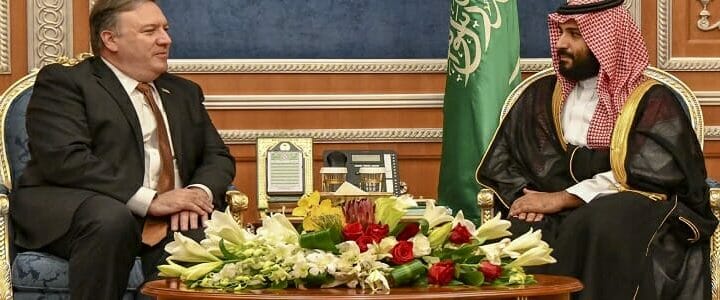Yemen was back in the news Thursday, for reasons both good and bad. On the same day that the belligerents reached a tentative agreement to back off the fighting around the port city of Hodeidah, the U.S. Senate passed a War Powers Act resolution to end U.S. support for the Saudi effort.
The Senate vote is largely meaningless, but still represents a rebuke of the Kingdom of Saudi Arabia. Senators used the vote to express their disgust at the actions of Crown Prince Mohammed bin Salman and the murder of journalist and dissident Jamal Khashoggi.
A tripartite agreement in Stockholm
The Saudis, the exiled Yemeni government, and the government of the Houthi rebels have been meeting in Stockholm, Sweden to find a way to ease the suffering of civilians caught in between the belligerents. Since the Houthis seized power in 2014, more than 10,000 civilians have died in the fighting. The casualties around Hodeidah, a Red Sea port about halfway between the Saudi border and the Bab al-Mandab Strait where the sea meets the Indian Ocean, have been especially bad recently. The Saudi-led coalition has been pushing to retake the port since June.
Office of the Special Envoy of the Secretary General for Yemen (or the Special Political Mission for Yemen, take your pick) is charged with “supporting Yemen’s return to a peaceful political transition in accordance with the Gulf Cooperation Council Initiative, the outcomes of the National Dialogue and Security Council resolutions.” British diplomat Martin Griffiths, an expert in conflict resolution, leads the mission for the UN.
In the agreement signed Thursday, the parties agreed to an immediate cease-fire in the city of Hodeidah itself, which had been the scene of house-to-house fighting. They agreed to redeploy forces outside the port city, as well as the nearby ports of Salif and Ras Issa.
While many of the details remain unspecified and left to a later date, the withdrawal of troops from the three ports and the city of Hodeidah itself will happen within 21 days.
This is welcome news. While the Houthi rebels are not the recognized government of Yemen, and are little more than Iranian surrogates, the carnage around Hodeidah has been horrific. The Saudis have not, as I’ve said before, displayed much of a penchant for target selection. Their pilots’ lack of discipline has resulted in many needless civilian deaths. Their quest to restore the legitimate government of Yemen is justified, but they have shown startling indiscretion. The agreement to pull back from Hodeidah is the only proper course at the moment.
The Senate is still not happy
Two weeks ago, fresh on the heels of a candid briefing from CIA Director Gina Haspel about the Khashoggi murder, the Senate voted 63-37 to advance a War Powers Resolution to curb U.S. support for the Saudi efforts in Yemen. At the time, I said that the vote was not necessarily an indication of the final vote tally. Many Senators voted to advance the resolution so they could have a full and frank discussion of Saudi actions on the Senate floor.
While I was correct in that assessment, the resolution still passed Thursday afternoon. Senate Majority Leader Mitch McConnell tried to entice his colleagues to vote instead for a different resolution, one that declared MBS personally responsible for Khashoggi’s death. Instead, the majority did both; the War Powers resolution passed by a vote of 56-41, and the MBS resolution passed by an unanimous voice vote.
Clearly, Senators are fed up with Saudi behavior, which has admittedly reflected a stunning disregard for modern international standards. But I still believe the Saudi relationship is too important to throw away wholesale.
The resolution is going nowhere; the House has already taken steps to ensure it won’t pass. The president would have vetoed it anyway. It is still significant. For one, it marks the first time the Senate has passed a resolution invoking the War Powers Act. And regardless, it is clear that Senators are no longer willing to tolerate Saudi Arabia’s behavior. The king is all-powerful inside the Kingdom. The world is dependent on Saudi oil. But neither of those facts translate to an ability to disregard the standards of civilized behavior on the international stage.
Hopefully, the Senate’s action will serve as a wake-up call for MBS and his crew. The U.S. needs Saudi Arabia, and Saudi Arabia needs the U.S. The people of Yemen need both of us. In Iran, the ayatollahs are wringing their hands, waiting for the U.S.-Saudi relationship to crumble so they can step-in to fill the power void.
No sane person wants to see Iran become the preeminent power in the Middle East. Yemen is the first line of defense against that. The U.S. must not walk away now.


